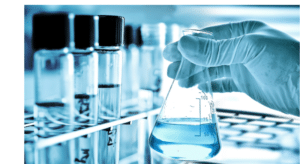Serology and IgG Antibodies Explained
Antibodies/Serologic Testing Explained
Serologic testing is used to analyze blood specimens for the presence of proteins, called antibodies, made in response to an infection. The presence of specific antibodies indicates that an individual has been infected by that specific pathogen. For many infectious diseases, serology is used retrospectively to confirm prior infection and/or to indicate that an individual has developed an immune response to the pathogen. The specific test that can identify people who may have been previously exposed to COVID-19 and may have developed an immune response to the virus is referred to as the IgG antibody test.

Serologic Testing Methodology
Unlike PCR (Polymerise Chain Reaction) tests, which commonly use swabs to detect active Covid-19 infection, blood samples are usually used for antibody tests. This is because there will be a very small amount of the Coronavirus circulating in the blood compared to the respiratory tract. Blood specimens for COVID-19 antibody testing can be collected by a hospital or health system or in any setting where a licensed phlebotomist can draw blood.
What your Results Mean
Knowing your IgG status can provide additional insight into prior exposure to COVID-19 and potential for immunity, which can help identify who may be able to resume work and other daily activities in society.
While a positive IgG antibody response suggests immunity from re-infection, the duration of such protective immunity varies depending on the infectious agent and is unknown for some pathogens. Antibody tests should not be used to diagnose Coronavirus infection. Diagnosis of COVID-19 is made by detection of COVID-19 RNA by PCR testing methods.

Use of Serology in COVID-19 Management
The use of serology may help determine the number of individuals who had COVID-19, as antibodies should be detectable in individuals who were infected and have since recovered, even those who were asymptomatic.
Around 8 to 11 days after the peak of the virus, detectable levels of IgG antibodies are developed in most individuals, becoming antibody-positive by 14 days after the onset of symptoms.
Early data suggests that following a primary infection, re-infection is unlikely. Thus, individuals who test positive for IgG with a serologic test and negative for the presence of the virus, using the RNA test (Test Code 39448), could be allowed to return to work with reduced risk to the individual and others.
Diagnosing Active COVID-19 Infections
IgG antibody testing should not be used to diagnose an active infection, and symptomatic patients should always be diagnosed using a molecular COVID-19 test. This PCR Test, which detects the presence of viral RNA, rather than the presence antibodies, aids in the detection of COVID-19. By detecting viral RNA, which will be present in the body before antibodies form or symptoms are even present, these tests can determine if someone has the virus very early on. This test is performed on respiratory specimens collected from individuals who meet the Centers for Disease Control and Prevention (CDC) clinical and/or epidemiological criteria for COVID-19 testing. Because serologic testing only assesses the presence of antibodies post-infection, it is not recommended nor should it be used to diagnose COVID-19 in an ill patient. When a patient is symptomatic, a PCR test is most useful for detecting the virus.

Room for Error
It is important to note that no test is perfect. It is expected that there will be a limited number of false positive serologic test results. This means that some individuals could go back to work believing that they are protected from developing COVID-19 when they may not be. It’s important that any testing strategy account for required confirmatory or repeat testing.
For information on how your workplace can be tested immediately, please visit www.nms123.com or contact us at [email protected] or 800-269-0502.
